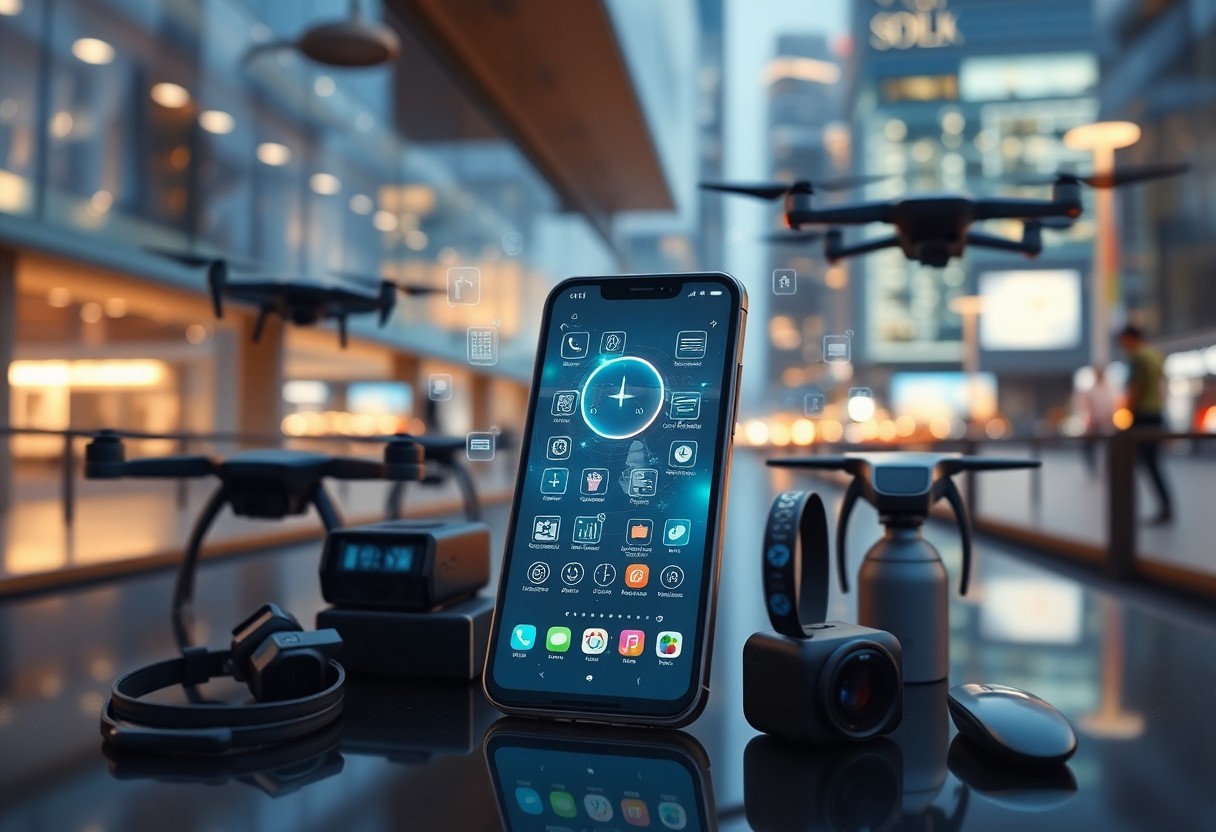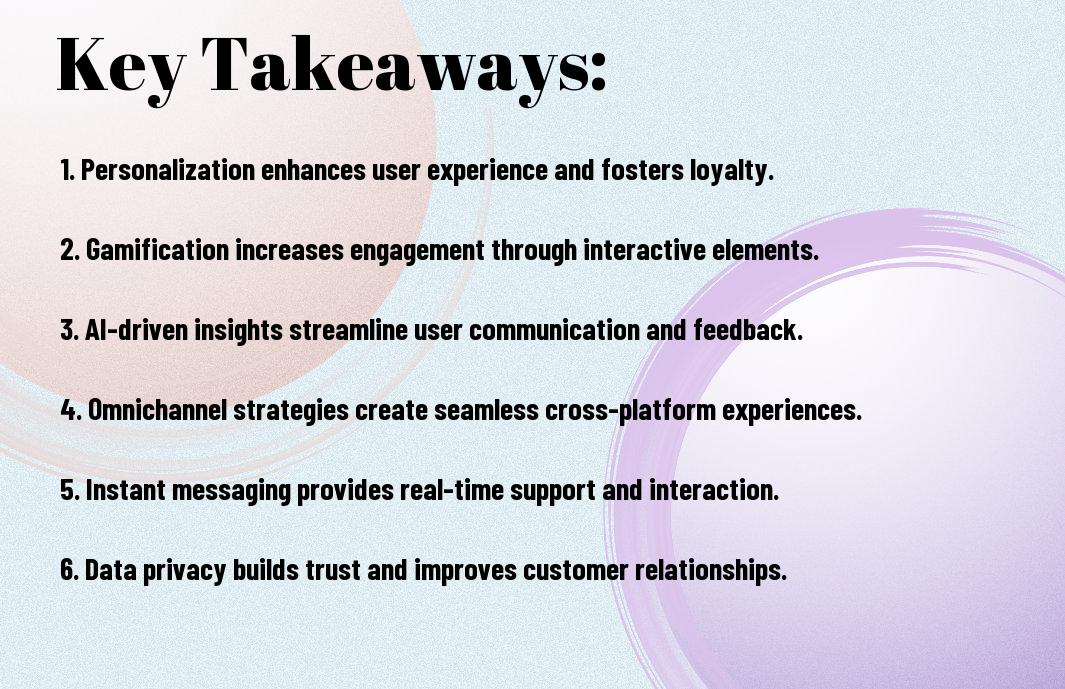As you navigate the ever-evolving mobile app landscape, you’re likely wondering what’s on the horizon. Your mobile device is about to become even more integrated into your daily life, thanks to emerging technologies like AI and augmented reality. You can expect significant changes in how you interact with your mobile apps, with innovations promising to enhance your user experience and simplify your life.
Key Takeaways:
- The rise of 5G networks is set to revolutionize the mobile app industry, enabling faster data transfer rates, lower latency, and greater connectivity, which will pave the way for more immersive and interactive app experiences.
- Artificial intelligence (AI) and machine learning (ML) are being increasingly integrated into mobile apps to enhance user engagement, personalize experiences, and improve overall app performance, leading to a more seamless and intuitive user interface.
- Augmented reality (AR) and virtual reality (VR) technologies are becoming more prevalent in mobile apps, offering new ways for users to interact with digital information and blurring the lines between the physical and digital worlds.
- The Internet of Things (IoT) is expanding the scope of mobile apps, enabling them to connect with a wide range of devices and sensors, and creating new opportunities for innovative apps that can control and interact with the physical environment.
- Mobile apps are shifting towards a more sustainable and accessible design, with a focus on reducing battery consumption, improving accessibility features, and promoting digital wellbeing, which will lead to a more responsible and user-centric app development approach.
Current Mobile App Landscape
While exploring the mobile app industry, you can find valuable insights on The Future of Mobile Apps: 5 Trends Shaping Innovation Part 1, which highlights the latest developments shaping your mobile experience.
Market Evolution and Statistics
After analyzing the current market, you’ll notice significant growth in mobile app usage, with statistics showing an increase in downloads and revenue, indicating a thriving industry that continues to evolve and shape your mobile interactions.
User Behavior Patterns
Below the surface of mobile app usage, you’ll find complex user behavior patterns that influence your app preferences and engagement, revealing opportunities for innovation and improvement in your mobile experience.
Plus, as you investigate deeper into user behavior, you’ll discover that personalization, convenience, and seamless experiences are key factors driving your engagement with mobile apps, and understanding these patterns can help you make informed decisions about your mobile strategy and app development.
Emerging Technologies
Some of the most exciting developments in mobile apps are emerging technologies that will shape the industry’s future, and you will be at the forefront of this revolution, leveraging innovations to enhance your user experience.
Artificial Intelligence Integration
Between the lines of code and innovative designs, you will find AI integration playing a significant role in mobile apps, enabling you to enjoy more personalized and interactive experiences.
Augmented Reality Solutions
Around every corner, you will discover new AR solutions that are changing the way you interact with mobile apps, offering immersive and engaging experiences that blur the lines between reality and fantasy.
The use of AR solutions in mobile apps will allow you to visualize products, try out virtual clothes, and explore virtual environments, giving you a unique perspective on the world, and you will be able to explore these possibilities in various industries, from gaming to education, and retail, making your mobile experience even more exciting and interactive.
Cross-Platform Development
Many mobile app developers are turning to cross-platform development to streamline their workflow, and you can learn more about the latest trends in The Future of Mobile Apps: 4 Trends Shaping Digital Transformation. This approach allows you to create apps for multiple platforms using a single codebase.
Progressive Web Apps
After exploring cross-platform development, you’ll find that progressive web apps offer a seamless user experience, combining the best of web and mobile apps, allowing you to access your favorite apps from any device.
Universal Development Frameworks
Development of universal frameworks has made it easier for you to build cross-platform apps, with popular options like React Native and Flutter leading the way, enabling you to create high-quality apps with a single codebase.
Considering the benefits of universal development frameworks, you’ll find that they offer a cost-effective solution for building cross-platform apps, allowing you to reach a wider audience and increase your app’s visibility, while also simplifying the maintenance and update process, making it easier for you to manage your app’s lifecycle.
Privacy and Security
To ensure the future of mobile apps is secure, you need to consider the latest innovations in privacy and security, as your personal data is becoming increasingly vulnerable to cyber threats.
Data Protection Measures
By implementing robust data protection measures, you can safeguard your sensitive information from unauthorized access, giving you greater control over your digital footprint.
Biometric Authentication
Measures such as facial recognition and fingerprint scanning are becoming more prevalent, allowing you to securely access your devices and apps with ease.
Consequently, as you explore biometric authentication, you will find that it offers an additional layer of security, making it more difficult for hackers to gain access to your personal data, and you can enjoy a more secure and seamless user experience.
Internet of Things Integration
Unlike traditional mobile apps, those integrated with the Internet of Things (IoT) offer a more immersive experience, allowing you to control and interact with your surroundings in new ways. As you explore the possibilities of IoT, you’ll discover how it can enhance your daily life.
Connected Ecosystems
With the rise of connected ecosystems, you can expect seamless interactions between your devices and other smart objects, creating a more convenient and efficient lifestyle. You’ll be able to control multiple devices with a single interface, streamlining your daily routines.
Smart Device Synchronization
Beside the benefits of connected ecosystems, smart device synchronization enables you to access and manage your data across all your devices, ensuring you stay connected and up-to-date. You’ll be able to start something on one device and pick it up where you left off on another.
In addition, as you probe deeper into smart device synchronization, you’ll find that it offers more than just convenience – it also provides a more personalized experience, allowing you to tailor your devices to your preferences and habits, making your life easier and more enjoyable. You’ll be able to customize your settings, receive tailored notifications, and enjoy a more intuitive user experience across all your devices.

Monetization Trends
For mobile app developers, finding effective monetization strategies is vital to generating revenue and sustaining growth, and you will need to stay ahead of the curve to succeed in this competitive landscape.
Subscription Models
By adopting subscription-based models, you can create a steady stream of income and encourage user loyalty, allowing you to focus on delivering high-quality content and services to your subscribers.
In-App Revenue Strategies
Revenue streams from in-app purchases and advertising will continue to evolve, and you can leverage these strategies to increase your earnings and enhance your app’s overall user experience.
In fact, as you explore in-app revenue strategies, you will discover that personalization and targeting are key to maximizing your returns, and by analyzing user behavior and preferences, you can tailor your approach to meet their needs and increase your revenue potential.
Summing up
To wrap up, you now have a glimpse into the innovations shaping the mobile app industry. As you consider your next move, explore The Future of Mobile App Development: Trends & Technologies to stay ahead. You will be better equipped to navigate your mobile app development journey, leveraging the latest advancements to enhance your user experience and drive your business forward.
FAQ
Q: What are the latest innovations that will shape the future of mobile apps?
A: The future of mobile apps is being shaped by several innovations, including the integration of Artificial Intelligence (AI) and Machine Learning (ML) to enhance user experience, the rise of Augmented Reality (AR) and Virtual Reality (VR) for immersive experiences, and the development of 5G networks for faster data speeds and lower latency. Additionally, the Internet of Things (IoT) is also playing a significant role in shaping the future of mobile apps, enabling seamless interactions between devices and creating new opportunities for mobile app development.
Q: How will the increasing use of cloud computing impact the development of mobile apps?
A: The increasing use of cloud computing will have a significant impact on the development of mobile apps, enabling developers to create more scalable, secure, and flexible applications. Cloud computing will allow for greater storage capacity, reduced latency, and improved collaboration among development teams. Furthermore, cloud-based services such as Backend-as-a-Service (BaaS) and Mobile-Backend-as-a-Service (MBaaS) will simplify the development process, enabling developers to focus on creating innovative and user-friendly mobile apps. This will also lead to faster deployment and updates of mobile apps, improving the overall user experience.
Q: What role will security play in the future of mobile apps, and how can developers ensure the protection of user data?
A: Security will play a vital role in the future of mobile apps, as the increasing amount of sensitive user data being stored and transmitted through mobile devices creates new risks and challenges. To ensure the protection of user data, developers must prioritize security measures such as encryption, secure authentication, and regular updates. Additionally, developers should implement robust testing and validation procedures to identify and address potential vulnerabilities. The use of advanced security technologies such as biometric authentication and behavioral analytics can also help to prevent unauthorized access and detect suspicious activity, providing an additional layer of protection for user data.





